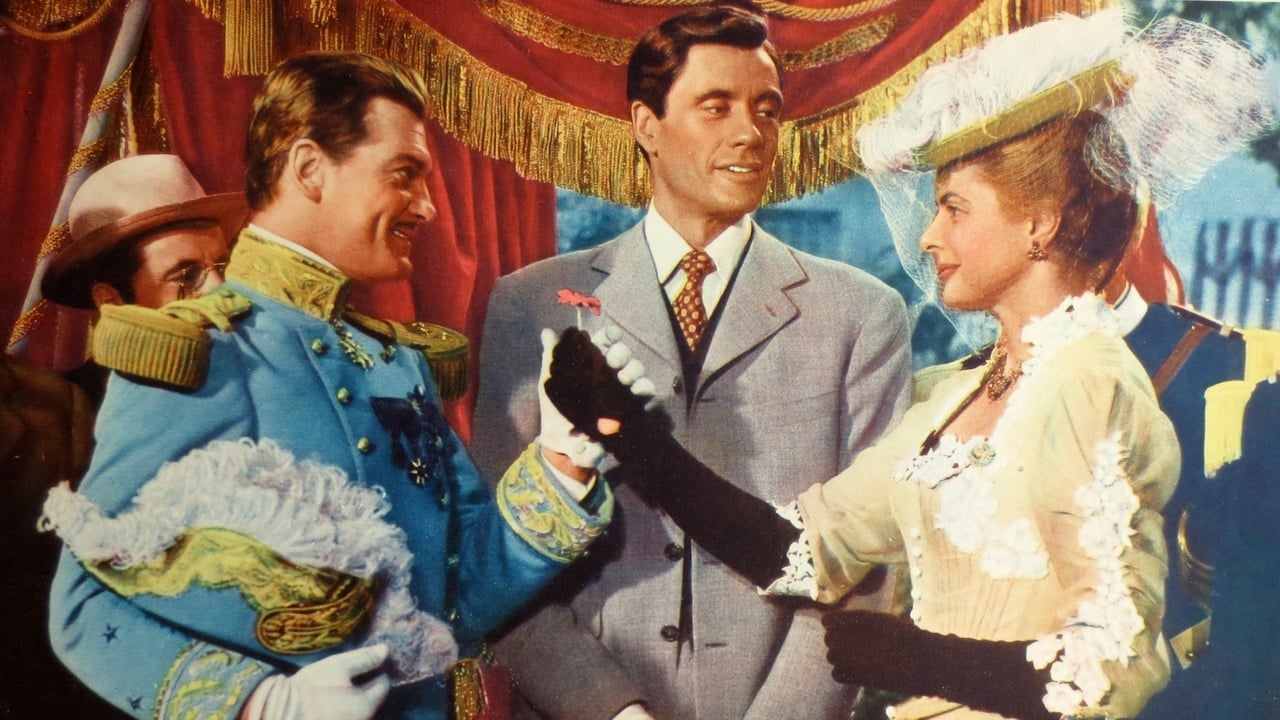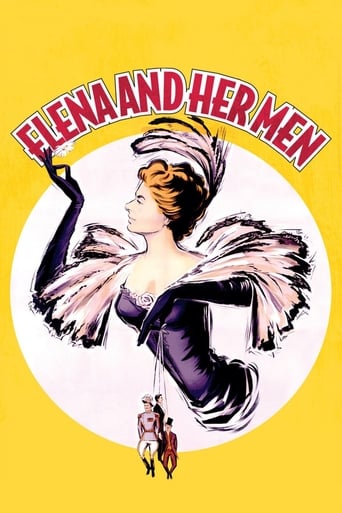

Don't listen to the negative reviews
... View MoreIt's simply great fun, a winsome film and an occasionally over-the-top luxury fantasy that never flags.
... View MoreThis movie tries so hard to be funny, yet it falls flat every time. Just another example of recycled ideas repackaged with women in an attempt to appeal to a certain audience.
... View MoreBy the time the dramatic fireworks start popping off, each one feels earned.
... View MoreBy embodying in a woman the archetype of an idealized France, Renoir, positively expands the perception of the feminine role, issues already evoked and debated in that period of the fifties, but that Renoir, inserts in a farces France of 1890, about to live a blow Where Elena (Ingrid Bergman) is the muse capable of influencing General François Rollan (Jean Marais), and consequently changing the political directions. In order to move this turbulent relationship further, there is the figure of Le Comte Henri DE Chevincourt (Mel Ferrer), who falls in love with Princess Elena, tries anyway to keep out the possible opponents of his love affair, something not simple for Henri, since Elena Is a poor finance widow, but rich in candidates for a new marriage."Elena ET Le's hommes" already begins with a comical and embarrassed request of marriage of Martin-Michaud (Pierre Bertin), suddenly refused by the Princess. In this first "take" we are already inserted in marks that have made the work of Jean Renoir singular and prosperous in the cinematographic grammar. The play with windows and doors (perhaps inherited from the theater and the circus spectacles), the effects of cutting in planes and against fields, working with depths, but without adding something new, Renoir more than inventing, I knew, mainly in this Delimit the necessary number of resources to tell a story.One reason why Renoir is regarded as a modernist is that many of his films have a looser narrative compared to the typical Hollywood films of the time, Renoir's plots were generally less structured and more open to the digression, which would become The dominant mode of European art films from the 1960s, but Elena and her men unfortunately are not. The great cast and the need to follow historical events closely together give the film a much more complicated story line, which is much less open and enjoyable than the other two. The only excursions that Renoir allows himself are the many scenes of farce, but framed in a contained, even bland laugh, due to the novelty nothingness of the jokes. Renoir thought it would be fun to see serious actors in scenes that were pushed to the point of absurdity, but forced humor attempts do not work.Elena, while occasionally suggesting that the state of the nation is at stake, represents more a theater of the heart than a theater of war, and Renoir seems determined to move completely out of the domain of realism, but contradictory it is on that road he prefers The opposite of what is suggested by the prophetic shadow of wars or battles there is a palette of vivid and colorful colors, for the battle here is of love, as it is phrased in the film "In a country where the Love, there is no room for wars. " In addition to the colorfully used to counter the proposals of a war movie, its importance is also in the perspective of an archetype of the protagonist of the film, Elena is a contrary joyful widow, although all the adversity of his life still maintains traces of the freshness of youth , The joy of better days and the sensuality of colors, reflected in their costumes and the colorful composition of the paintings - excellently captured by the photograph of Claude Renoir, nephew of Jean Renoir - paintings always ornamented with flowers, a spring and Utopian's France , Considering the events of the past and the threatening future.Curiously it is with a flower (daisy), that Elena presents General Rollan, claiming to be a lucky charm. Among the many symbolic that this flower evokes, the most interesting is the wisdom to use as a resource to promote links, since the general, for various reasons, always loses it, and the repair of this amulet only occurs when Elena offers another , That is, Elena herself is the lucky charm. The good things that happen to the general and consequently to France occur when Elena is close to the general. A second curiosity is that 14 years before, in the movie "Casablanca", it is also with a daisy that Ilsa Lund Laszlo (Ingrid Bergman) presents Richard Blane (Humphrey Bogart), and with the same effect of an amulet that finally gives luck, But can not promote the bond between the characters.A sum inseparable from what nourishes the film is the quality of its actors, especially when considering the little experience or familiarity with comedy and or farce. Ingrid Bergman as Princess Elena Sokorowska is a ladder to various comic moments, but rarely can she produce comedy of her own, which is not a problem in the film at all, her princess turns out to be moments of female freedom, sensuality and action leader. Jean Marais as Gènèral François Rollan is also more ladder than comic, but he punctuates his general and the love triangle with Le Comte Henri DE Chevincourt (Mel Ferrer), but the high point of the comedy is in the characters that appear to be, a A reference to characters such as the harlequin, Pierrot and Columbine of the comedian dell'Artie, depicted in the film by Eugène (Jacques Jouanneau), Lolotte (Magali Noël), the princess' maid and Hector (Jean Richard).Although the use of Renoir's misc en scene is as interesting as ever, and the positive performances, this is possibly his least interesting film. For, it generates a superficial and less enveloping tale.
... View MoreSilly concoction is a minor work for all involved. Ingrid, in her last foreign film before her Rossolini fueled exile from Hollywood ended with her triumphant return in Anastastia, is charming and her dresses are incredibly beautiful. But the settings have a sense of falseness to them, even wealthy people's homes look like someone lives there, these are obvious sets. Even the outdoor scenes have a claustrophobic feeling of being stage-bound. Renoir doesn't seem comfortable with the material or perhaps he didn't believe in it, either way it's missing a light touch that would have turned the film into a charming soufflé instead of the flat farce that it is. Mildly amusing but almost completely forgettable.
... View MoreI couldn't help seeing some of the negative remarks here, making light of a truly venerable French film. They don't come any more glamorous.Seeing Ingrid Bergman as captured by Jean Renoir also reduces the cavils to ordinary vanity on the part of pompous reviewers. After all, it's Le Comedy Francais, not Ingemar Bergman diamond-cutting. To understand this kind of refined madcap, you have to lighten up! Even today with two world wars and world-wide depressions behind us; Ingrid the mother of all film actresses appears effortlessly artful and glamorous. Champagne doesn't age as spectacularly as this movie has. Together with the grandiose military posturing of Jean Marais, and with France in its Belle Epoque, Renoir gave us his own brilliance to treasure. Spoiler alert: Sorry to say poor Mel Ferrer alas, was out of his league. But he never danced better. The cameras betrayed his inner ardor, he was in love with Ingrid, as what virile hunk wouldn't be, holding her close? I'd have tumbled for her in a New York minute. The camera never loved her more audaciously either. Here is a lovely old movie with class.I have only two plebeian thumbs. They serve little purpose here but to contradict so many art connoisseurs in these pages who presume to teach Jean Renoir et Companie how to film a French romantic farce. Well, I offer two thumbs up! To all who remember the grace and beauty of Ingrid Bergman, then: SEE THIS JOYOUS MOVIE!
... View MoreSeveral posters have quoted Renoir voicing his desire to make a film showing Ingrid Bergman smiling to camera. The short answer is wouldn't we all whilst the harsh reality is that only a select few got to do so. At this stage of her career Bergman couldn't get arrested; in 1949 she left Hollywood to make a picture in Europe, fell for director Roberto Rossellini and never looked forward. After five turkeys in Italy she was probably ready to open a vein but within the year, after making this for Renoir, she was back where she belonged and with an Oscar to boot for Anastasia. This is one of three movies that Renoir made in color around this time and on balance it's better than The Golden Coach, which isn't hard, and about even with French Can Can. Renoir probably figured that with so much going for her Bergman could get away with a couple of wooden leading men and Renoir picked two doozys in Jean Marais and Mel Ferrer, solid mahogany in both cases. The plot is actually based on a real incident in French history but Renoir is content to give it a once-over-lightly and concentrate on replicating the paintings of his father in set up after set up. In its pastel colors it resembles another film of the period Les Grandes Manouvres which is no bad thing. All in all it remains a pleasant trifle showcasing a beautiful and charismatic actress.
... View More